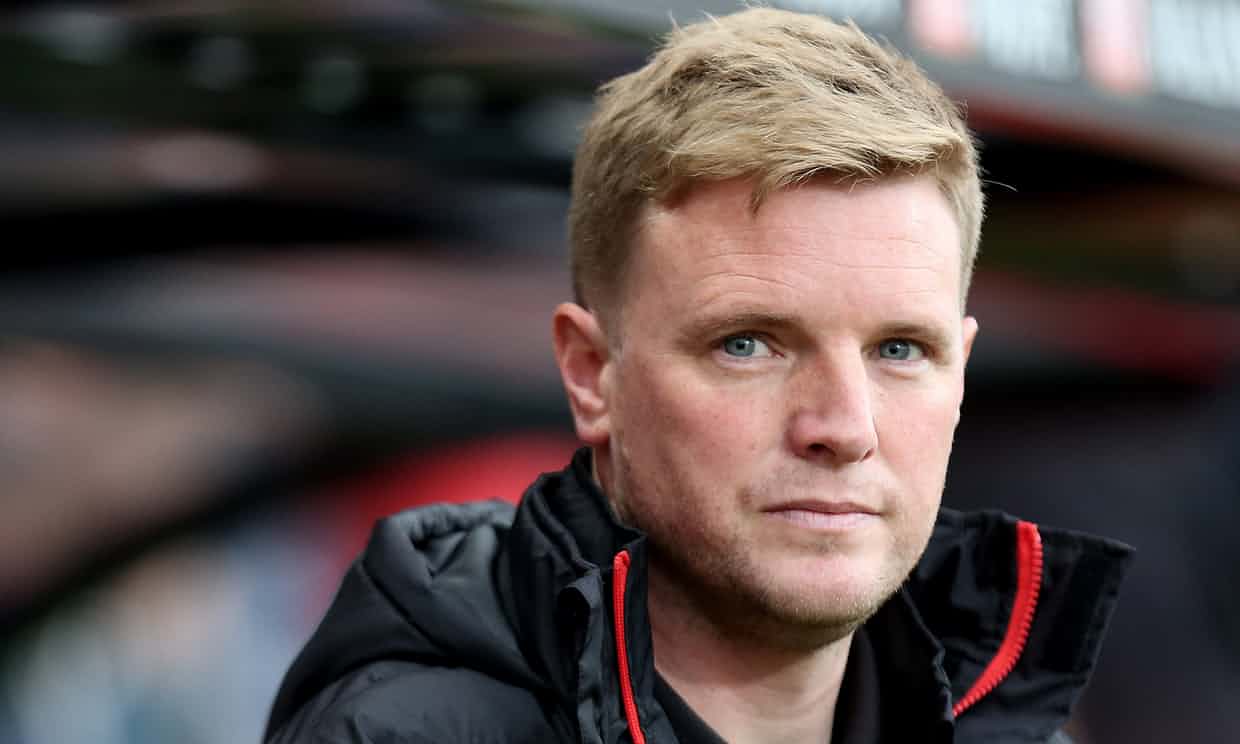London- The Premier League has been going for 25 years and it is still no closer to being won by a team with an English manager.
Actually that might not be completely true. Eddie Howe’s Bournemouth finished ninth last season and in the arid landscape of English achievement since Howard Wilkinson took Leeds United to the final old First Division title in 1992 that possibly counts as progress. There have certainly been seasons, 2015-16 being the most recent, when the top 10 positions were the exclusive province of foreign coaches.
This season will begin with only four English managers in charge of Premier League clubs – Howe, Sean Dyche, Paul Clement and Craig Shakespeare. The picture is softened slightly by three more “home-produced” managers in Mark Hughes, Tony Pulis and Chris Hughton (two Welshmen and an Irishman, even though the Brighton manager was born in London), but set against that is the absence of anyone from Scotland. For the first five years it was dominated by Scottish managers and, even after Arsène Wenger arrived to break the sequence, Sir Alex Ferguson’s enormous influence meant eight of the first 10 titles went to teams led by Glaswegians. Now there are noneand it may be a while, to judge by the recent experiences of David Moyes and Paul Lambert, before one of the oldest traditions in English football reasserts itself.
At least, and we are talking small consolations here, the English managers in situ appear to have a decent chance of keeping their jobs. The bookmakers favour Rafael Benítez and Slaven Bilic as the first managerial casualties of the season, though that could have more to do with the volatile situations surrounding Newcastle and West Ham than any perceived shortcomings on the part of the coaches. The bookies’ annual sack-race betting is usually a market best avoided anyway – this time two years ago Claudio Ranieri was being quoted among the favourites for the chop, while 12 months later he was regarded as bulletproof – though there is a theory that clubs are beginning to view foreign coaches as expendable while home-grown managers tend to be granted a little more patience.
This is only a theory, and an embryonic one at that, and nothing is likely to save Craig Shakespeare or Paul Clement should their clubs struggle to put results together, though what Bournemouth and Burnley have achieved in recent seasons has been an example others are seeking to follow.
Bournemouth, in their two years in the top flight, have shown that with continuity and club spirit even the smallest operation can successfully compete. Last season Howe’s side were never in any real danger of being dragged down. Burnley were relegated after one Premier League season under Dyche but they kept faith with the manager, kept most of the squad together and came back stronger for the experience.
There is money to be made in the Premier League, not just the prize money shared around each season but parachute payments should the worst come to the worst, and clubs seem to have realised that with sensible management there is no need to take huge financial risks in order to survive.
The boom-and-bust syndrome appears to have given way to something more principled and pragmatic, at least for smaller clubs where the object is not to dispute the major prizes but to acquit themselves well in the top tier and continue to improve.
There, in a nutshell, is the position of English/British managers at the moment. They will almost always be found at smaller clubs, striving capably for survival rather than setting out with any real designs on silverware. A club such as Stoke or Swansea can make life difficult for members of the top six, though, Leicester’s miraculous 2015-16 season apart, there seems little prospect of these mid-table sides actually joining them.
While that situation persists, it is open to question whether individual managers will make the leap on their own either. There has been talk of Howe as a successor to Wenger at the Emirates, based on the similarities between the type of football both men like to produce, though when it finally comes to the crunch Arsenal are much more likely to opt for a ready-made, Champions League-hardened replacement from the continent.
Similarly Manchester United will not be making another Moyes-type mistake in a hurry. That move was made with the best of intentions – unless it was expressly conceived for the purpose of keeping José Mourinho out – but it failed because elite players now expect, and have the power to demand, elite managers. So do their agents.
The managerial jobs being done at the various strata within the Premier League are all quite different and, though there is not that much hard evidence to go on, what has been seen so far suggests that movement between compartments is as difficult for individuals as it is for teams. Even Sam Allardyce could not crack it. The only upward move he was able to make was the England job and we all know what happened there. Yet Allardyce has an impressive record. He might have done well at a top side but it will never be known now, because he was never asked.
It would be pleasant to imagine Dyche or Howe or Clement picking up a similar amount of experience and being head-hunted by a leading club, though it is unlikely to happen without a major change of attitude. As long as leading clubs can afford to take their pick from the seemingly endless supply of charismatic and well-qualified foreign coaches keen to take up positions in this country, the only source of solace for English managers in the Premier League is that their prospects are much healthier than those of Scottish ones.
The Guardian Sport
